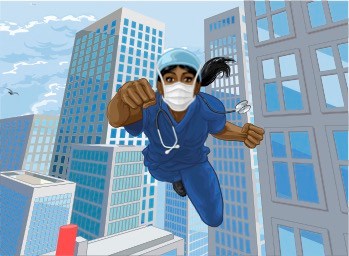Congratulations! You made it through residency. On to the next stage of your emergency medicine career: attending-hood (and for some, fellowship)! Here are 10 tips we learned during our first year as attendings at an academic emergency medicine department.
- Efficiency comes with time. Start off making sure you are methodical. Unlike residency, you will no longer have an attending physician re-ordering hemolyzed labs or ensuring a negative hcg prior to obtaining a CT scan. You’re the attending now. No one will be there to catch your mistakes, so make sure you take time to be detailed. Create a disposition checklist, and do not hit the discharge or admit button without double checking that everything you wanted ordered has a result. Also, make sure to share all results and disposition plans with your patient and the rest of the team.
- Be the advocate your patients and colleagues need. We can all remember a time in residency where a patient disrespected a colleague, or vice versa, and the team just stood there. As the attending, you have control of patient-physician-team dynamics. If you have a consultant who is being disrespectful to a resident on your team, speak up and remind them that you are all working together toward a common goal of doing what is in the patient’s best interest in a collaborative and safe setting.
- Learn names. Trust us, this makes an enormous difference. Learning your colleagues’ names and roles (i.e., nurses, technicians, unit secretaries, environmental service members) shows your interest in your new colleagues and can help to form bonds and friendships. Furthermore, it reaffirms the valuable role each team member plays in the ED. Practically speaking, “name recall” helps you quickly know whom to ask when you are leading a resuscitation or need a piece of rarely used procedural equipment.
- Trust your training. You trained for 3 to 4 years in an emergency medicine residency. You cared for victims of gunshot wounds and patients with hypotensive shock, you delivered babies, and you did everything in between. Although you will absolutely encounter presentations you never saw in residency (likely during your first attending shift), always go back to the basics — addressing a patient’s ABCs will get you far.
- If the dispo ain’t dispoin’ — do more tests or don’t send the patient home! If a patient’s presentation is not matching the results of your workup, trust your gut! You may have overlooked something and need to do more lab tests or a CT scan to make the correct diagnosis. Your first year as an attending is not the year to worry about earning the title of the attending who “orders the least number of CT scans” or “admits the least.” Whatever workup you need to go home and feel you provided the best possible care for a patient is the right workup.
- Study for your boards. Although the pass rate for the ABEM boards was 92% for first-time test takers in 2021,1 we all know smart colleagues who did not pass. Don’t wish you had studied; just study.
- Remember, you always have something to teach your residents. As a new attending in an academic emergency department, you are responsible for teaching EM and off-service residents and medical students. We all felt intimidated being a teacher as a new attending, especially if we were not the type of attending who could quote the latest research study. However, we all realized that how we gather a history, perform a physical exam, and execute workups, resuscitations, and procedures is teaching material. Varied practice patterns teach residents “the art of EM” as they finesse their own medical decision-making and practice patterns. Often, the best residency training is discussion of past patient cases.
- Find a mentor and a sponsor. You are probably asking yourself, “Wait, what is the difference between a mentor and a sponsor?” A mentor provides guidance and knowledge to you about your career. A sponsor speaks about you in rooms where you are not present and actively presents opportunities to you to enhance your career. These people will be instrumental in helping you navigate the complexities of your academic career.
- Remember, you are not alone. Imposter phenomenon is real! We were fortunate to be part of a crop of attendings fresh out of residency. Knowing that we can reach out to each other (or to former co-residents at different institutions) without judgment for reassurance has been invaluable. Also, remember: Senior faculty from your residency or new hospital are a priceless resource and have been in your shoes. So, when you feel yourself freaking out, reach out to other newbie attendings, former co-residents, or senior faculty to put that imposter phenomenon in its place.
- Take care of yourself. A little twist on the words of RuPaul, “If you can’t take care of yourself, how are you going to take care of anyone else? Can I get an Amen?” Many of us have put off our own mental and physical health during medical school and residency to pursue our dream job. Figure out what it is that you need (e.g., exercise, time with family and friends, mental health counseling) to become the happiest version of yourself in and out of the ED.
Bonus tip: Believe that you’ve got this. You are going to be a great attending physician!
Reference
- American Board of Emergency Medicine. 2021 Qualifying Examination Scores: Frequently Asked Questions (FAQs). Accessed March 20, 2021.



